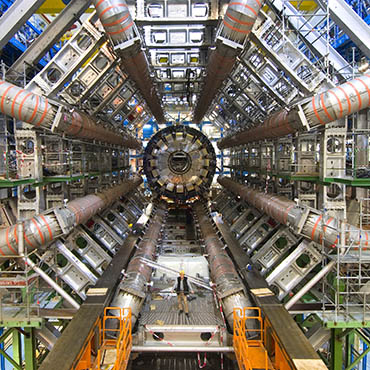Hadron collider data tap open again
The facility shut down in 2012 for modifications that increased the volume and quality of data generated.

The ATLAS detector at the European Large Hadron Collider involves physicists from Brookhaven National Laboratory. (Image: CERN)
Department of Energy national laboratory scientists have their data buckets ready to catch the torrent of information from the newly restarted Large Hadron Collider in Switzerland.
International scientists restarted the particle research facility on the Swiss/French border on June 3.
The LHC is the world's premier facility for the study of high energy particle physics that could help explain the origin of the universe and other mysteries of science. In 2012, the facility discovered the Higgs boson -- a fundamental particle that explains why certain elementary particles have mass.
On June 3, scientists at the facility operated by CERN -- the European Organization for Nuclear Research -- began recording data from high-energy particle collisions for the first time in three years. In 2012, the collider was shut down for modifications that increased the volume and quality of data the facility can generate.
National lab scientists predicted in a June 3 statement that they will match the amount of data generated throughout the collider's first three-year run in 2012 within the next five months, eventually accumulating 10 times more data by the end of 2017.
Through the LHC, researchers worldwide, including more than 1,700 U.S. physicists, can again study the Higgs boson particle, search for dark matter and develop a more complete understanding of the laws of advanced physics.
U.S. DOE laboratories will tap into that widening big data stream using ESnet, a $62 million, 13,000 mile global network of high capacity fiber optic cables purchased from commercial providers that carries ever-increasing volumes of big data. That data will travel to computers and data centers at 18 U.S. institutions.
The LHC re-start has implications for commercial big data storage and computing, as well. In March, big data storage solution provider Seagate said it had entered into a three-year partnership with CERN openlab, a public/private collaborative development project, to develop the Seagate Kinetic Open Storage platform. Seagate said the partnership aims to help CERN better manage and store the 100 petabytes of data the LHC has generated to date, as well as the additional two to three petabytes of information it produces on a monthly basis.
NEXT STORY: The War Over NSA Spying Is Just Beginning





